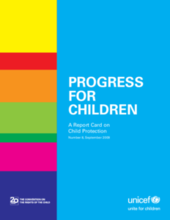While progress is being made in reducing some violations of children’s rights, not enough is yet known about the extent of abuses against children. Violence and exploitation remain a harsh reality in the lives of many children around the world.
Millions of boys and girls around the world are subject to trafficking, are without parental care, or lack documentation they need to attend school and access basic health care. Millions more are forced to work under harmful conditions, while others face violence or abuse in their homes, in their schools, in their communities, in institutions or while in detention, often from the adult entrusted with their care.
These issues are reviewed in a new UNICEF report -- “Progress for Children: A Report Card on Child Protection,” -- released by UNICEF Executive Director Ann M. Veneman on 6 October 2009.
Children in such circumstances are experiencing fundamental infringements of their human rights, and suffering physical and psychological harm that has wide-reaching and sometimes irreparable effects.
“A society cannot thrive if its youngest members are forced into early marriage, abused as sex workers or denied their basic rights,” said Veneman. “Understanding the extent of abuses of children’s rights is a first step to building an environment where children are protected and have the opportunity to reach their full potential.”
The report gathers together for the first time data on a range of issues that impact on children, including sexual abuse and trafficking, child marriage, physical punishment of children, child labour, birth registration, the harmful traditional practice of female genital cutting, and attitudes toward violence against women inside marriage.
Some abuses – such as sexual exploitation and trafficking – are usually committed in conditions of secrecy and illegality, which makes collection of accurate data challenging.
Where data are available, some progress is evident. For example, the data shows that in Bangladesh, Guinea and Nepal – three countries where child marriage is prevalent – the median age of marriage is rising, although it is still below 18 years of age. The report also identifies a slow decline in female genital mutilation/cutting (FGM/C) in countries where such abuse is common.
Included in the report’s findings are:
-
More than half the children in detention worldwide have not been tried or sentenced.
-
In some parts of the world, the births of two out of three children were not registered in 2007. In Somalia and Liberia less than 5 per cent of births are registered. Birth registration is an important element in building a protective environment for children for a range of reasons, including that without a birth certificate they are more vulnerable to sexual exploitation, trafficking and illegal adoption.
-
More than 150 million children between 5 and 14 years of age are engaged in child labour. Child labour is often both a result and a source of poverty. It can compromise a child’s education and perpetuate the poverty that pushed them into the workforce.
-
More than half of women and girls in developing countries think that wife-beating is acceptable and, younger women are as likely to justify wife-beating as older women. In most regions, neglecting the children is the most commonly cited justification for wife-beating.
The report also offers a strategy to improve child protection, identifying five areas of activity that are needed to improve protective environments for children: 1) improving child protection systems; 2) promoting social change; 3) enhancing protection in emergencies; 4) strengthening partnerships for greater impact; and 5) collecting reliable data and using such data to achieve concrete results for children.
“This report on harmful practices and abuse of children comes just six weeks before the 20th Anniversary of the Convention of the Rights of the Child,” said Veneman. “The evidence of continuing harm and abuse must inspire the world to greater effort to guarantee the rights of all children, everywhere.”

